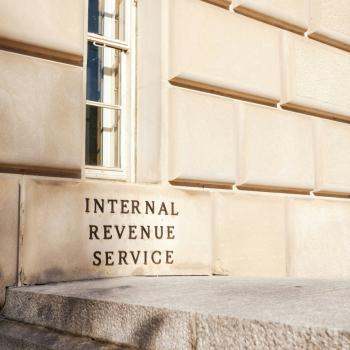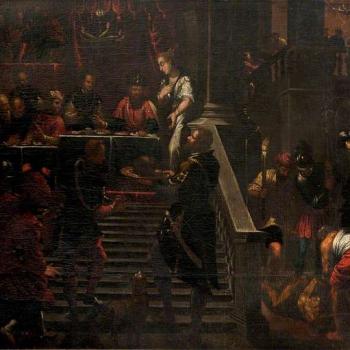Last week, I made my first trip to Arizona. The thermometer read 105 degrees, but the locals told me that the weather was relatively mild. I was invited to the Grand Canyon State to participate in "Hot Summer Nights," a conversation and discussion series sponsored by a megachurch in the town of Gilbert. A member of the congregation would interview me for one hour and then I would take thirty minutes of questions from the audience. My recent book, Was America Founded as a Christian Nation: A Historical Introduction, would be the topic of conversation.
One of the pastors told me in advance that "Hot Summer Nights" was a very popular event at the church. Last summer the congregation hosted John McCain. Yet, despite the warning, I must admit that I was quite shocked when a few hundred people packed into the church café. These Christians showed up on a July evening—a night in which Phoenix hosted the Major League Baseball All-Star Game—to learn about history! I was impressed.
The interviewer for the evening was Steve, a prominent Phoenix attorney and businessman. While I was a bit skeptical about discussing Christian America with someone from the business world, Steve turned out to be the perfect inquisitor. A devout evangelical Christian and a graduate of Princeton's Woodrow Wilson School of Public & International Affairs, Steve was more than up to the task.
He began the interview by turning to the audience and asking, "How many of you believe that America was founded as a Christian nation?" Nearly every hand in the room went up. This was not a good sign. As a historian and author, I wanted my readers, and the people seated in the café that evening, to see that Steve's question defied easy "yes" or "no" answers. Nevertheless, I had spoken to this kind of crowd before and I was just about ready for anything.
I smiled and settled in for what I thought would be a long night.
Steve handled the evening like a real professional. He questioned some of my assumptions, but also gave me the freedom to elaborate on some of the book's central themes. There was even a "lightning round" in which Steve peppered me with questions and demanded short and concise answers. (Steve learned that "lightning rounds" do not work very well with historians who make their living preaching the complexity and nuance of the past). The question and answer session following the interview was spirited. I am not sure that everyone was happy with my historical approach to the subject, and a few members of the audience made this abundantly clear, but in general I left optimistic. I wanted my fellow evangelicals to see the value of historical thinking and I think I largely succeeded.
When I arrived home, someone asked me if it was worth it to fly all the way out to Phoenix to speak for one hour to a group of evangelicals about whether or not the United States was founded as a Christian nation. I answered with a resounding "yes."
As I have written before in this column, there are many evangelical Christians who embrace inaccurate and politically charged views of the American founding because they are unaware that any other Christian position on this subject exists. I have seen this firsthand as I have traveled to churches and taught Sunday School classes. There are a lot of people who can't imagine that a fellow evangelical might have disagreements with the kind of history that folks like David Barton are preaching. When evangelicals learn that such an alternative view exists, some of them are open to change. They begin to think about the relationship between Christianity and nationalism in a more nuanced way. I have seen it happen. I will admit that it does not happen as often as I would like, but it does happen.
My hot summer night in Phoenix, and the dozens of other talks and interviews I have given for Was America Founded as a Christian Nation, has forced me to rethink my vocation as a Christian, historian, and intellectual. I am now more convinced than ever that academics and scholars should be able to take their research and explain it to a popular audience in an enthusiastic and passionate way. This requires taking the time to leave the ivory tower, hitting the road and meeting people in all kinds of settings, and bringing knowledge and serious Christian thinking to real places and communities.





